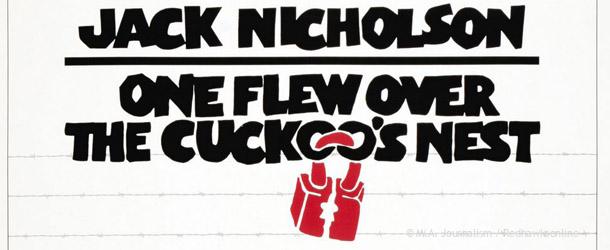A classic look inside the mind of a mental patient
Rebellion is often depicted through this archetypal lens: a cabal of young, yet strong-hearted soldiers riot against the tyranny of destructive overlords and their army of lethally loyal troops. Whether it’s the empire’s subtle command in Star Wars or Pirates of the Caribbean‘s portrayal of a type of people striving to survive in a dying world against the throne, acting against the higher power and overruling is one of cinema’s favorite way of giving the audience an obvious side to root for. It would be near disastrous to present a film that had an indistinguishable good and evil.
Maybe that’s what makes Milos Forman’s One Flew Over the Cuckoo’s Nest a psychedelic stronghold of cinema. Based on the 1962 novel by Ken Kesey, the film combines a series of mutinous intentions with unknown motivations and the question of whether there’s clean-cut good and evil present in the story.
Set in the mid-’60s, the story starts with a new patient being admitted to a mental ward. He goes by the name of McMurphy (Jack Nicholson), and his eventual path to becoming a symbol of confidence and leadership among the other men causes the ward to grow from blandly peaceful to triumphantly disorderly.
But both the doctors and staff in the hospital consider McMurphy’s high dosage of optimism a hazard, specifically the head nurse, Nurse Ratched (Louise Fletcher). The rivalry between the two becomes a gambling challenge of wits, and McMurphy begins to question her role as the boss in the ward and begins to defy her through his uprising of the others living in the ward.
Although the emphasis of the original novel is focused mostly on McMurphy, what Forman (as director) did with the character of Nurse Ratched is what makes the movie a separate interpretation of the novel rather than simply an adaptation.
Originally, Kesey’s book represents Ratched as an iron-fisted, stern dictator who got her way consistently and stubbornly. And while the movie still draws concern over the dictatorship of the character, there’s a higher level of sympathy and moral in her portrayal by Louise Fletcher, who won the Academy Award for best actress, which was well deserved as it’s a difficult character to both understand and stimulate strong emotion from.
McMurphy’s shift from the book to the film is not as drastic as Ratched’s. Questionable and high-strung, his situation in the ward is prominent in the overall plot. The viewer must decide whether his insanity is real or feigned, and if that’s what makes him more of an anti-hero than a true protagonist. His motivation is skeptical and his quirks cause him to be both likeable and unreadable. Nicholson, along with Fletcher, won an Academy Award for his performance as the rowdy, gambling McMurphy.
When novels are converted into film, there are two distinct sides quarreling on how a director handled the process. Either they must be heavily faithful to the original material or they must branch out and use their creativity to make their own work. A mutual agreement between the two is the desired outcome, and that’s what Forman was able to do with Cuckoo’s Nest.
The analyzing process can be tedious, equivalent to a struggling high school senior working to finish a term paper. But unlike the student, Forman’s interpretation isn’t riddled with spelling mistakes, grammatical errors, and senior slide syndrome. Instead it’s a profound work of art that illustrates the various points of view that are present in the story.
Still considered a triumph in cinema, One Flew Over the Cuckoo’s Nest illustrates a new way to bring the world of novels into the universe of cinema and its various platforms.

